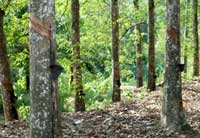
Indonesia, Malaysia and Thailand – world-leading producers of natural rubber – will collaborate to develop a Rubber City within the Indonesia-Malaysia-Thailand Growth Triangle (IMT-GT) region. The foursites: Kedah in Malaysia, Songkhla in Thailand, and Tanjung Api-Api and Sei Mangkei Special Economic Zone (SEZ) in Indonesia will jointly boost rubber consumption through downstream activities and manufacture of value-added products.
Indonesia, Malaysia and Thailand collectively account for 66% of the global natural rubber production. In April 2019, the countries agreed to cut natural rubber exports by 240,000 tonnes for a period of four months.
Director of Centre for Indonesia-Malaysia-Thailand Growth Triangle Sub-regional Cooperation (CIMT), Firdaus Dahlan, said the three countries need to stabilise the rubber price in the global market – the CIMT will soon establish projects to be led by the private sector and facilitated by the governments to explore opportunities in downstream rubber industry in the IMT-GT region.
The IMT-GT initiative, formed in 1993, comprises 14 provinces in southern Thailand, eight states of Peninsular Malaysia, and the 10 provinces of Sumatra in Indonesia. Their 12th Summit was held in Bangkok recently, chaired by Indonesian President Joko Widodo and attended by Malaysian Prime Minister Tun Dr. Mahathir Mohamad, Thai Prime Minister General Prayuth Chan-o-cha, Asean Secretary General Datuk Lim Jock Hoi and Asian Development Bank (ADB) President Takehiko Nakao.
The report on implementation of projects and progress actions upon seven key strategic pillars of IMT-GT was presented at the summit, which led to an assessment of the five existing IMT-GT economic corridors and a study on the proposed sixth corridor linking three southern border provinces of Thailand with Perak and Kelantan in Malaysia, and southern Sumatra in Indonesia to enhance trade, tourism, and physical connectivity.
IMT-GT has implemented US$47 billion worth of physical connectivity projects (PCP) since its establishment, including the completed South Sumatera Light Rail Transit in Palembang. Ongoing projects such as the Customs, Immigration and Quarantine (CIQ) centre in Songkhla and Betong Airport in Thailand, and the Dumai-Melaka Ro-Ro Service between Malaysia and Indonesia are expected to be completed next year.
Single-entry visa for IMT-GT areas has also been proposed to promote joint tourism circuit and route with the diversity among its tourism destinations to increase tourist arrivals in the three countries.
According to Firdaus, the IMT-GT Summit was fruitful as the leaders of Indonesia, Malaysia and Thailand are committed to enhancing trade, investment and connectivity within the sub-region. Meanwhile, the Leaders’ Joint Statement emphasised their goodwill to achieve IMT-GT Vision 2036 which is aligned with the Asean Vision: “The leaders have agreed to strengthen and accelerate the economic cooperation to achieve mutual goals. Opportunities in connectivity, transportation and logistics, infrastructure, energy, trade, environment, investment, tourism, and human resource development should be fully maximised to achieve inclusive growth to increase the peoples’ quality of life.”
